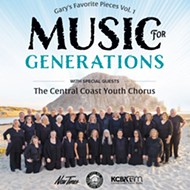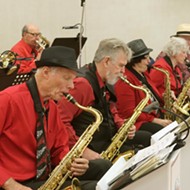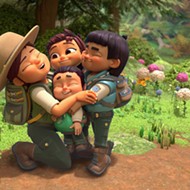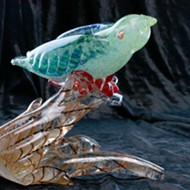[{
"name": "Ad - Medium Rectangle CC01 - 300x250",
"id": "AdMediumRectangleCC01300x250",
"class": "inlineCenter",
"insertPoint": "8",
"component": "2963441",
"requiredCountToDisplay": "12"
},{
"name": "Ad - Medium Rectangle LC01 - 300x250",
"id": "AdMediumRectangleCC01300x250",
"class": "inlineCenter",
"insertPoint": "18",
"component": "2963441",
"requiredCountToDisplay": "22"
},{
"name": "Ad - Medium Rectangle LC09 - 300x250",
"id": "AdMediumRectangleLC09300x250",
"class": "inlineCenter",
"insertPoint": "28",
"component": "3252660",
"requiredCountToDisplay": "32"
}]
Anne Schroeder wants to do for Cholame what John Steinbeck did for Salinas. She’s working on the three-book series of her dreams, writing about the history of Northern San Luis Obispo County, weaving together tales of native residents, Catholic encroachment, and generations of local life.
The Shandon native teaches writing classes over the Internet and speaks at conferences. She’s also publicity director for SLO NightWriters, a local group that, as may be obvious, is made up of people who write. Mostly at night. Or at least during distraction-free times snatched out of busy schedules.
Schroeder joined the group around 1989, a year after it first started. Among her many notable achievements as a NightWriter, she’s the winner of the group’s 2011 Gold Quill award. Her short story about a tense situation in a cantina took first place in last year’s contest, open to writers near and far.
She said that the piece was essentially an excerpt from a novel of hers, which was, in turn, made up of several short stories. Schroeder explained that one of the secrets to writing is playing with length.
“If you’re going to write a 500-word short story, first write a 3,500-word short story so you understand what you’re writing,” she said, noting that she’d expand and contract stories as writing exercises.
Another secret? Finish stories and send them out. Schroeder said she first entered the NightWriters contest early on in her membership.
“I didn’t win that year,” she said, “but I took my entry and entered it in a flash fiction contest, and I won that.”
Schroeder estimated that she’s had about 50 short stories of hers published around the country, and she’s won about 20 different awards. She said that none of it has changed her life, but she can look back and see her body of work evolving.
Mark Arnold may not match her in volume, but the contest spirit courses in his inky blood, too. He said he enters three or so a year, including some in the 16,000-word novella range.
This year’s NightWriters contest is the fourth for the former professor with a PhD in communications—now working on becoming an author—though it’s the second with him at the helm.
Arnold said he’d been with the group for two years, and then was standing in the wrong place when the contest directorship fell on him. He committed to not just taking on the task, but improving it as best he could. He said it was still operating “in the Dark Ages of paper and pencil and typewriters and things” in 2010, so he aimed at getting the most out of the group’s website, ushering in an era of electronic submissions. He also sought what he called “reputable” judges, stacked in two tiers for a filtering process.
He said that the changes upped the contest’s credibility.
“We made sure that people knew this was not a group of local people who were getting together over coffee,” he said.
President Dennis Eamon Young agrees: “This is the day and age where it would be silly for us not to run the contest that way, because if a writer’s going to submit a story to an editor anywhere, it’s going to be done that way,” he said. “Might as well get used to doing it that way.”
Arnold sees the group as “teetering on the edge of something,” and would love to see more professionals get involved. He joked that people may look at the group and see it as little old ladies sipping tea and chatting. He adopted a mockingly frail tone: “Your work has touched me!”
Sure, that element can be a part of the group, but it’s certainly not the only demographic. Not hardly. And with increased diversity comes increased membership overall. President Young, who describes himself as an itinerant photographer, said he moved to the area in 2007 to marry a longtime sweetheart, and he immediately joined the group.
“At that time, it was down to 55, 60 members,” he said. “Now, it’s 189. So we’ve grown tremendously.”
He doesn’t really claim credit for that boost, though. He likened the presidency to being a figurehead on a ship. And lest anyone think that the office confers any special treatment, Eamon ruefully tallied his own score.
“I enter the contest every year, and every year I don’t win,” he said. “But that’s no reason not to enter, because my work keeps getting better.”
Eamon is working on a few novels, mostly adventure stuff. One is based on time he spent with an archeologist in Ireland, poking around ancient mounds, visiting cliffs literally bristling with artifacts, and exploring a passage where the spring equinox sends a shaft of light to illuminate arcane writing that’s yet to be deciphered.
Closer to home, Eamon is looking for the group to start a mentoring committee to work with new writers. He’s also encouraging members to start new critique groups.
Like Arnold, he’s excited about the future, noting the developing marvels of ebooks and the increasing reality of electronic communication.
“We’ve got some just smashingly technologically astute people. I’m not one of them, unfortunately,” he admitted with a laugh. “That’s why we have those other people who are astute.”
Last year’s technological leap forward brought in more than 80 entries, and contest director Arnold is hoping for even more this year. The theme for this year's contest is forgiveness, so submissions should reflect that in some way.
Arnold said he sees the bulk of the writing fall into one of two categories: entertainment (which he likened to Katy Perry’s “Fireworks”—pure fun, and great at what it does) and message (in other words: communicating values).
Then there’s the stepladder analogy he outlined, with spelling, punctuation, and grammar on the first step. Successful writers should then ascend through careful descriptions, a solid story arc, and emotional impact, he advised.
But the most important may be the hardest to do: finish and submit.
Executive Editor Ryan Miller was a judge in last year’s NightWriters contest. Send comments to [email protected].










